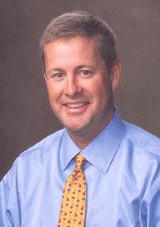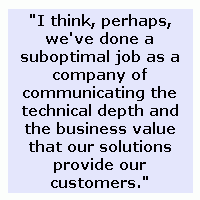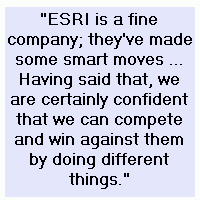
Editor-in-Chief, Joe Francica, met with Mr.Wise on September 17th to determine his assessment of the industry and his outlook on Intergraph's position in the marketplace.
Joe Francica (JF): You've been in the position for a few months, what is your assessment of the market for location technology?
Halsey Wise (HW): Certainly, as you know, IMGS (Intergraph Mapping and Geospatial Solutions) is a pretty sizeable and significant division of Intergraph by revenue; the largest unit of Intergraph.The market, as I know it, has continued to evolve.I think the market for GIS and Location-based services continues to grow.Having said that, a lot of the end markets that a lot of us sell into continue to, primary federal and local governments obviously have been challenged budget-wise, and deficit-wise which is something that we all hope will change in the not too distant future.
I think the markets that are important to us; I think our strategy to date has been one that is perhaps different than some of the others in this market.We are not trying to be all things to all people.I think our market position from where we are leads us to a position where we are going to attempt to take certain vertical target industries and lever our domain experience on top of GIS capabilities and move on from that stand point.So, I think you'll see us try to be specialists in certain markets rather than being all things to all people.
JF: And what are those markets as you see them right now?
HW: I think some of them as outlined today are utilities and
telecommunications.This is one that we feel that our combination of our
technology, products, and customer experience, and I underscore the experience
side, the domain expertise that really helps us expand that type of vertical.
The other would be transportation.

JF: With the transportation market, Intergraph's strength has been
in DOT market.Is that going to be a particular focus still or will you
branch out into local government transportation, fleet management in the
private sector, etc.
HW: We are looking at all those markets, and as you said, six
weeks in (the job), one of the jobs I've tasked our team with is to present
me with markets shapes and sizes.One thing that I've focused a lot of
my time on is, "how big is the market," "what's our position and what's
our ability to win this particular market." So, we have to continue to
work on some of the new markets.Our strategy will be to have a specialization
attack and not try to dilute our emphasis where we may or may not be able
to win as effectively as we might using our domain expertise.
JF: Obviously one of the things that the company is concerned about
is being number two in the GIS market.What is your perspective on attacking
the leader in the market, ESRI?
HW: ESRI is a fine company; they've made some smart moves, made
some fine decisions and we respect them.Having said that, we are certainly
confident that we can compete and win against them by doing different things.
One of the things you will hear is this "differentiation" theme.We will
go into markets where we think we will bring added value to and to bring
the "decision-making" science, if you will, out of the GIS data.
JF: Your background had been in developing large professional services
organizations.Is that going to be a key focus of yours at Intergraph and
mapping in particular?
HW: My background is sort of a mix between software, services,
and finance.So, I probably bring a unique perspective to Intergraph and
perhaps the industry in that I'm not an engineer.Having said that, one
of the viewpoints that I bring regularly is to think in terms of economic
shapes, shapes of markets, shapes of risks...how do you win, on a risk-adjusted
basis, how do you approach certain markets.So, I try to focus on that.
I neither advocate nor have issue with services, if that's the right way
to win.So, we take each of our areas and determine the right mix of software
and services and solutions are appropriate and gauge it from that point.
JF: Do you feel any particular pressure from the stockholders to
go in one way or the other?
HW: No, not at all, not in that regard.Our shareholders just
want us to increase our earnings potential.And that's certainly an area
that I am focused on heavily.They sort of leave that up to me and the
board to determine what the mix is, whether it is more software or less,
or more services or less.I think our plan is to look forward to determine
the direction that will take the company and how it will continue to move
up our operating margins across all our business units.I think that's
no different than any company CEO that has that charge.

JF: It seems to be that the evolution of the GIS market that it
has come to the end of the lifecycle of putting out "boxes" of software.
Both ESRI and MapInfo have really moved to a service oriented business.
MapInfo, in particular, had made their mark by selling inexpensive software.
Intergraph's flagship software products, GeoMedia and other before it,
seem to be an increasingly less significant part of the revenue stream.
Do you see that and will there be more emphasis on services because of
that?
HW: I think we've attempted to take a customer-focused approach.
Whatever the customer wants a more of a services orientation, based on
GeoMedia or based on other things, we would certainly go that angle.I
think the industry seems to be saying is that the software is important
but the software only provides only one piece of the package.We're really
here to make really informed decisions on the information that the software
provides us.And if that takes more services work to extract or package
or deploy that information in an intelligent way, then that's certainly
the angle that we would go.
JF: Intergraph had an initiative to address the challenges facing
small and particularly rural local governments with "jump starting" their
efforts in GIS by providing them with some software.However, because of
the long lifecycle of getting started with GIS, some services are necessary
and when you win a customer you may be lucky enough to be there for a long
time.Is that a strategy you will continue?
HW: We've seen this evolution with other software packages and
vertical markets as well in that there is an early adoption as a heavy
license growth mix and then as it matures or as it changes, that the relative
mix of software to total revenue goes down as services becomes a bigger
piece of it.Certainly, that's important.One of the aspects of services
that our customers have asked us is to help with the domain expertise;
that is the value that we provide to them.From our side, the services
you provide to them, the switching cost go up.And certainly, that is a
key aspect of our strategy.
JF: One of the things that surfaced in a recent conference call was
that the profit margins in IMGS were low.You had said that you wanted
to focus on your target markets.However, because the margins have been
low and for growth, do you think you have to look elsewhere?
HW: I think we are charged with looking at things were there
is higher growth markets; looking at markets where we have strength; looking
at areas where we are not successful or not spending a lot of time and
energy or resources, human or dollar-wise in those markets.In every business,
including our IMGS business, we'll continue to triage opportunities and
focus on areas we think will return the most.
JF: Is there any one particular business unit that has responded
well so far, such as Public Safety?
HW: Public Safety is doing fine.It is the smallest of the four
divisions.In term of the market shape, it is more fragmented than some
others.We are optimistic about some growth potential in public safety.
JF: Does homeland security come into play in that market?
HW: Yes, we are mindful of a couple of things when you say homeland
security.We are not attempting to pray on what might be in vogue or trendy
today.Having said that, within Public Safety and within our Intergraph
Solutions Group, ISG, we've got a number of initiatives, at large, within
homeland security.I think, perhaps, we've done a suboptimal job as a company
of communicating the technical depth and the business value that our solutions
provide our customers.So, I'm excited about some of those areas.
JF: The utility group at Intergraph has been "whacked" the last couple
of years either because of their own missteps with product or because of
market forces.What is your perspective for getting those guys out of a
hole?
HW: I don't know that we've got them out of a hole; they are
certainly part of IMGS today.I think the unit is performing well.We've
got some good leadership.I was extremely proud of how our customer base
performed during all of the highly known blackout and power outage.We
are on real-time, speaking with our customers.I was very pleased with
the feedback that we got from our customer base in that area.The utilities
market has been hit hard with all of the issues that are well know and
documented in the press.But the blackout has given some additional attention
to the infrastructure needs in the country.And so, we've had many conversations
with customers subsequent to them that have been energized.
JF: There is a lot of money in the bank for Intergraph because of
the patent infringement settlements recently.What are the options you
are reviewing for using those funds?
HW: All options are on the table.Our shareholders will expect
that we will evaluate all of our businesses and how we will grow those
appropriately and with the appropriate amount of risk over time.As well
as, what alternatives we'll consider to potentially return cash to shareholders.
Our board has that as a top priority.All alternatives are being evaluated
that you can imagine.And that's certainly a high priority for us.
JF.Thanks very much for your time and good luck in your new position.